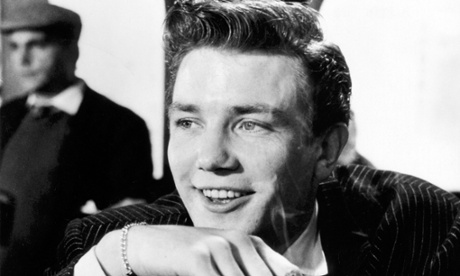
Saturday Night & Sunday Morning
Albert Finney’s break-out performance came courtesy of Karel Reisz’s kitchen-sink classic, based on the novel by Allan Sillitoe. He plays Arthur Seaton, the seething machinist, railing against the “bitches, whores and spineless bastards” who’ve infested his hometown. The town, incidentally, is Nottingham, although (as the caption helpfully points out) south-west London doubled for the film’s exteriors.
Tom Jones
Directed with gusto by Tony Richardson, Tom Jones is a bawdy, free-wheeling farce buttressed by irreverent asides and acid social satire as Finney’s foundling hero tumbles from bed to ball-room to duck-pond in an 18th-century England by way of Swinging 60s London. The film scooped four Oscars and established the actor as an international star.
Scrooge
The bullish, brooding 33-year-old actor may not have been the obvious choice to play Dickens’s querulous old miser in a musical re-telling of A Christmas Carol. Still, Finney brought an exuberant glee to a role that was to signal a curious sea-change in his career throughout the 1970s.
Murder on the Orient Express
Finney stars as Hercule Poirot in Sidney Lumet’s first-class adaptation of the Agatha Christie whodunnit, navigating a list of suspects that includes Ingrid Bergman, Lauren Bacall, Sean Connery and John Gielgud. Christie herself approved of the film with one caveat. Finney’s moustache, she felt, was far too skimpy.
Annie
Even billionaire Daddy Warbucks might have blanched at the cash that director John Huston threw at this all-singing, all-dancing version of the Broadway musical. A chrome-domed Finney plays the growling old tycoon who adopts a squawking orphan girl during the darkest days of the Great Depression. One setpiece street scene cost an estimated $1m to shoot, only for Huston to junk it and shoot the whole thing over again in a different location.
The Dresser
Finney reunited with his erstwhile kitchen-sink rival Tom Courtenay for this measured, quietly mesmerising portrait of the relationship between an ageing actor and his long-suffering personal assistant. Both men emerged from the dressing room with Oscar nominations.
Miller’s Crossing
The actor saw in the 90s in barnstorming style, playing a cigar-chomping Irish crime boss in the Coen brothers’ acclaimed tale of windblown fedoras and blazing machine-guns. Old Leo O’Bannon may look a soft touch, with his smoking jacket and monogrammed slippers - but break into his house and you pay the highest of prices.
Erin Brockovich
Finney bagged his fifth and final Oscar nomination in Stephen Soderbergh’s fact-based tale of triumph against the odds. He plays Ed Masry, the hardbitten lawyer who grooms Julia Roberts’s wronged single mum. In the event, however, it was Roberts who went home with the Oscar.
Before the Devil Knows You’re Dead
The actor gave his last great performance in Before the Devil Knows You’re Dead, the devastating swansong from director Sidney Lumet. This supple, muscular crime drama spins and pivots around a jewel heist gone horribly wrong. Finney’s tour-de-force as the devastated dad turned angel of vengeance showed that he had lost none of his edge as he eased into his eighth decade.
Albert Finney 1960 TV interview
Every young actor needs a stroke of luck and here’s Finney admitting his own in an early television interview. Would Finney have gone on to greatness if he hadn’t been dragged from the dressing room to replace Laurence Olivier in Coriolanus? Of course he would ... but it didn’t do him any harm.

